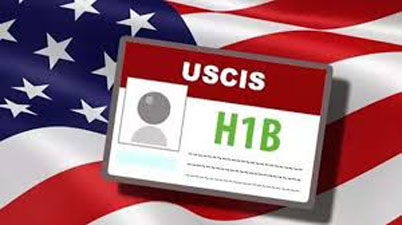NE NEWS SERVICE
WASHINGTON, AUG 4
In another huge blow to Indian IT professionals eyeing the US job market, President Donald Trump has signed an executive order asking federal agencies to hire Americans and preventing them from contracting or subcontracting foreign workers, mainly those with H-1B visas.
The move came over a month after the Trump administration on June 23 suspended the H-1B visas along with other types of foreign work visas until the end of 2020 to protect American workers in a crucial election year, PTI reported.
The H-1B visa, most sought-after among Indian IT professionals, is a non-immigrant visa that allows US companies to employ foreign workers in speciality occupations that require theoretical or technical expertise. The technology companies depend on it to hire tens of thousands of employees each year from countries like India and China.
“Today I am signing an executive order to ensure that the federal government lives by a very simple rule, hire American,” Trump told reporters in the Oval Office of the White House on Monday before signing the order against hiring H-1B visa holders for federal contracts.
Trump told reporters that his administration will not tolerate the firing of hardworking Americans in the pursuit of cheap foreign labour.
“As we speak, we’re finalising the H-1B regulation so that no American workers are replaced ever again. H-1B should be used for top highly paid talent to create American jobs, not as inexpensive labour programmes and destroy American jobs,” said Trump, who was surrounded across the Cabinet Room table with individuals campaigning against job outsourcing.
Prominent among them were Sara Blackwell, founder and president of Florida-based Protect US Workers organisation; Jonathan Hicks, a software engineer in the Tennessee Valley Authority; and Kevin Lynn, founder of Pennsylvania-based US Tech Workers.
The H-1B visa has an annual numerical limit cap of 65,000 visas each fiscal year as mandated by the Congress. The first 20,000 petitions filed on behalf of beneficiaries with a US master’s degree or higher are exempt from the cap.
The executive order requires all federal agencies to complete an internal audit within 120 days and assess whether they are in compliance with the requirement that only US citizens and nationals are appointed to the competitive service.
As a result, the Department of Labour will also finalise guidelines to prevent H-1B employers from moving H-1B workers to other employers’ job sites to displace American workers.
Trump”s order follows the federally-owned Tennessee Valley Authority’s (TVA) announcement that it will outsource 20 percent of its technology jobs to companies based in foreign countries.
TVA’s action could cause more than 200 highly-skilled American tech workers in Tennessee to lose their jobs to low-wage, foreign workers hired on temporary work visas, the president said.
Outsourcing hundreds of workers is especially detrimental in the middle of a pandemic, which has already cost millions of Americans their jobs, the White House said in a statement.
Given the current climate of rampant intellectual property theft, outsourcing IT jobs that involve sensitive information could pose a national security risk, it said. According to the White House, Trump’s actions will help combat employers’ misuse of H-1B visas, which were never intended to replace qualified American workers with low-cost foreign labour.
One of the participants presents during the signing of the order told the president that as many as 70 percent of the H-1B visa goes to people from India.
Trump said he favours a merit-based immigration system that brings in high-skilled people that creates jobs inside the US and not take away the jobs of Americans.
“We are going to be discussing very shortly an immigration bill, which covers this and many other things. It will be a very, very comprehensive bill. It”s a word that some people love, and some people hate. But it’d be very comprehensive only in the sense that it covered just about everything.
“It will be based on merit. It will cover territory that nobody would have thought could have ever been agreed to,” Trump said.
The bill will be signed after the convention, Trump said, referring to the ruling Republican Party event later this month where he would be formally nominated as the party’s candidate in the presidential election. Democratic Party’s candidate and former US vice president Joe Biden will challenge Trump in the November 3 election.
“Immigration will be very merit-based, but it’ll be, it’ll be great for the worker. And it’ll be great for people coming into our country, but coming into our country legally and loving the country and wanting to help our country as opposed to people coming in. And they don’t like our country,” Trump said.
Whether changes will be implemented and enforced remains to be seen, said Ron Hira, a Howard University professor who studies the H-1B visa regime.
Major Silicon Valley technology companies may be affected, as most have extensive contracts with the federal government and also obtain workers from staffing and technology firms, Hira was quoted as saying by The Mercury News.
The US government is by far the largest consumer of contracted information-technology work but data are scarce on how many H-1Bs may be working on government contracts or how much government contract work is being done overseas, the San Jose-based newspaper quoted Hira as saying,










